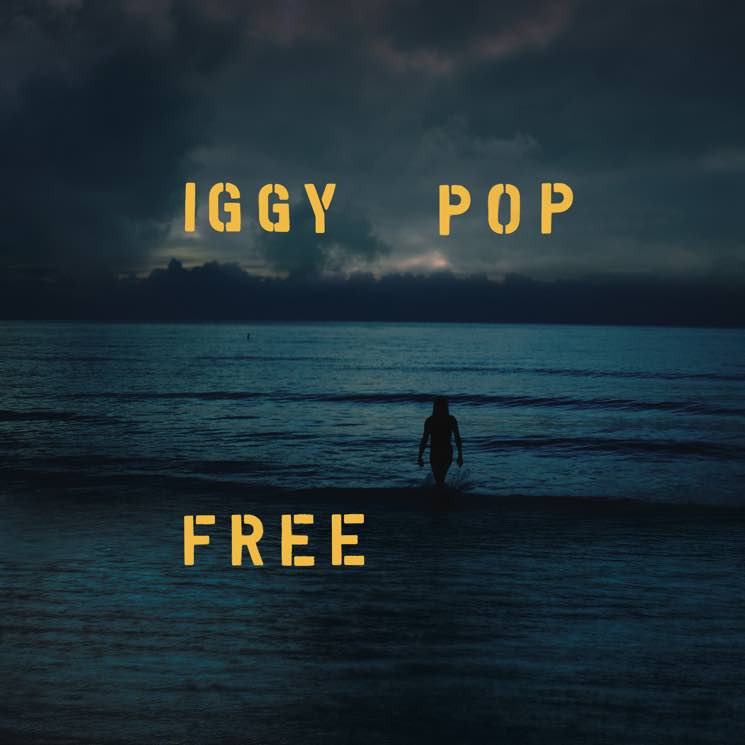Exploring the concept of personal freedom in a manner that's direct and musically sparse, Iggy Pop is reflective and resolute on his compelling solo album, Free.
Often, and rightly, cited as the prototypical punk who most closely impacted the generation of danger-embracing musicians who altered pop culture in the mid-1970s, Iggy has long been freedom personified. In the promotional materials for Free, he tells us his last big rock tour (behind 2016's Post Pop Depression) left him "drained" enough to want to simply vanish — to leave "Iggy Pop" behind and just be weird, old James Osterberg again. To be free.
Instead, he vanishes into the words of some others ("We the People" is a poem by Lou Reed; "Do Not Go Gentle" is one by Dylan Thomas) and worked with jazz composer Leron Thomas and Noveller's Sarah Lipstate for a different kind of soundscape — an often ambient, pulsing, open one that lets his voice float gently or roar above music that shifts and slithers like a moody organism.
The effect is hypnotic. "Loves Missing" catches our attention with a never-wavering groove, spare poetics and Pop employing his baritone voice to infer vivid meaning, in a similar fashion to the latter day output of his late friend, David Bowie. On the skittering "Sonali," Pop does what he does best, wittily dropping in contemporary terms to ground a big picture song and letting his voice lure us into being its friend. He channels Jim Morrison on (the ironically bass-led) "James Bond," which has a touch of frivolity, but nothing compared to the album's biggest, most outlandish statement, "Dirty Sanchez," which features an arrangement and lyrics as choice as its title, all delivered in Pop's high register snarl.
Free is exactly that — an icon tests his own core and audience expectations to get to something authentic within his current state of mind. On the whole, via his work and commentary, Iggy Pop has pushed our world to think and act differently, and he brings that same mission of liberation to himself on Free.
(Loma Vista)Often, and rightly, cited as the prototypical punk who most closely impacted the generation of danger-embracing musicians who altered pop culture in the mid-1970s, Iggy has long been freedom personified. In the promotional materials for Free, he tells us his last big rock tour (behind 2016's Post Pop Depression) left him "drained" enough to want to simply vanish — to leave "Iggy Pop" behind and just be weird, old James Osterberg again. To be free.
Instead, he vanishes into the words of some others ("We the People" is a poem by Lou Reed; "Do Not Go Gentle" is one by Dylan Thomas) and worked with jazz composer Leron Thomas and Noveller's Sarah Lipstate for a different kind of soundscape — an often ambient, pulsing, open one that lets his voice float gently or roar above music that shifts and slithers like a moody organism.
The effect is hypnotic. "Loves Missing" catches our attention with a never-wavering groove, spare poetics and Pop employing his baritone voice to infer vivid meaning, in a similar fashion to the latter day output of his late friend, David Bowie. On the skittering "Sonali," Pop does what he does best, wittily dropping in contemporary terms to ground a big picture song and letting his voice lure us into being its friend. He channels Jim Morrison on (the ironically bass-led) "James Bond," which has a touch of frivolity, but nothing compared to the album's biggest, most outlandish statement, "Dirty Sanchez," which features an arrangement and lyrics as choice as its title, all delivered in Pop's high register snarl.
Free is exactly that — an icon tests his own core and audience expectations to get to something authentic within his current state of mind. On the whole, via his work and commentary, Iggy Pop has pushed our world to think and act differently, and he brings that same mission of liberation to himself on Free.
